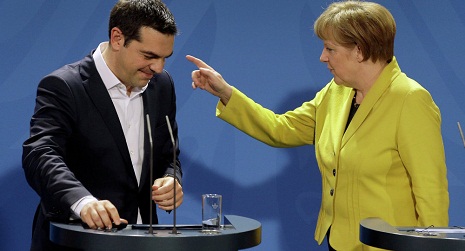Greece came in for further criticism this weekend, when it emerged that the Greek Energy Minister Panagiotis Lafazanis is to fly to Moscow on March 30 to negotiate lower gas prices for his country and find ways of increasing Greek exports to the Russian Federation, despite the EU sanctions over Ukraine.
Meanwhile, Greek Prime Minister Alexis Tsipras is expected to travel to Moscow next week to meet Russian President Vladimir Putin in a move that has left German politicians apoplectic with rage with the chairman of the Bundestag [German parliament] European Committee Gunther Krichbaum accusing Greece of "frittering away valuable time and trust".
He added:"Instead of asking for help from his comrades in Russia, Prime Minister Tsipras should finally put forward concrete and dependable reform proposals."
Very Risky Strategy
"Prime Minister Alexis Tsipras is carrying out a very risky strategy," Manfred Weber, the leader of the conservative EPP group in the European Parliament, told Der Spiegel.
"His flirting with Russia makes a constructive solution with Europe in these financial questions difficult."
Greece on Friday sent its creditors a long-awaited list of reforms with a pledge to produce a small budget surplus this year in the hope that it will unlock badly needed cash.
The European Union and IMF lenders, informally called the Brussels Group, began discussions on the reforms over the weekend.
Their approval, followed by the blessing of Eurozone finance ministers, will be needed for Athens to unfreeze further aid and stave off bankruptcy. Athens has not indicated whether the latest list will contain a more far-reaching reform program than a previous list of seven reforms on broad issues ranging from tax evasion to public sector reforms, which failed to impress lenders.
More about:
















































